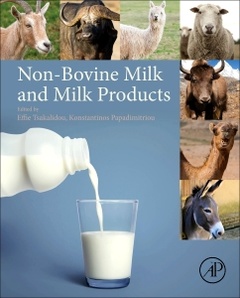Description
Non-Bovine Milk and Milk Products
Coordinators: Tsakalidou Effie, Papadimitriou Konstantinos
Language: English
Subjects for Non-Bovine Milk and Milk Products:
Keywords
Animal husbandry; Animal welfare; Breed; Buffalo; Buffaloes; Camel; Camels; Cheese; Climate change; Coagulants; Cow; Dairy goats; Dairy sheep; Diet; Donkeys; Emission intensity; Enzymes; Equine; Farming system; Fatty acid profile; Fermented milk; Food security; Freezing; Goat; Greenhouse gases; Health; High pressure; High-pressure homogenization; Human health; Human; Lactic cultures; Lactose; Live cycle analysis; Mastitis; Microbiological and molecular analysis; Microbiota; Milk adulteration; Milk enzymes; Milk processing; Milk productivity; Milk; Milking procedures; Mineral compounds; Minor dairy species; Noncow milk products; Noncow milk; Nutrients; Proteins; Pulsed electric fields; Reproduction; Sheep; Ultrasound; Vitamin; Weaning; Yak; Yogurt
286 p. · 19x23.3 cm · Hardback
Description
/li>Contents
/li>Readership
/li>Biography
/li>Comment
/li>
Non-Bovine Milk and Milk Products presents a compiled and renewed vision of the knowledge existing as well as the emerging challenges on animal husbandry and non-cow milk production, technology, chemistry, microbiology, safety, nutrition, and health, including current policies and practices. Non-bovine milk products are an expanding means of addressing nutritional and sustainable food needs around the world. While many populations have integrated non-bovine products into their diets for centuries, as consumer demand and acceptance have grown, additional opportunities for non-bovine products are emerging. Understanding the proper chain of production will provide important insight into the successful growth of this sector. This book is a valuable resource for those involved in the non-cow milk sector, e.g. academia, research institutes, milk producers, dairy industry, trade associations, government, and policy makers.
1. Food Security and the Role of Local Communities in Non-Cow Milk 2. Non-Cow Milk Production: The Greenhouse-Gas Emissions and Climate Change 3. Husbandry Practices and Animal Health 4. Influence of Animal Health, Breed and Diet on Non-Cow Milk Composition 5. The Composition and the Properties of Non-Cow Milk and Products 6. The Microbiota of Non-Cow Milk and Products 7. Existing Technologies in Non-Cow Milk Processing and Traditional Non-Cow Milk Products 8. Novel Technologies for Dairy Processing: Application for Non-Cow Milk 9. Macro- and Micro-Nutrients in Non-Cow Milk and Products and Their Impact on Human Health
Researchers studying non-bovine milk and milk products in both industry and academia; dairy science students and professors
Konstantinos Papadimitriou was awarded his PhD degree on the stress physiology of lactic acid bacteria in 2006 with distinction. Since then, Dr. Papadimitriou has worked in different projects funded by EU or national funds as a research associate in the group of Prof. Tsakalidou. His main research interests include the microbiology of milk and milk products, the physiology, the genetics and the genomics of lactic acid bacteria, the metagenomics of food ecosystems, single cell microbiology, plasmid biology and applied bioinformatics. Dr. Papadimitriou has published twenty-one original research articles and has received more than 200 citations. Dr. Papadimitriou and Prof. Tsakalidou are the editors of the book entitled “The stress physiology of lactic acid bacteria published by Springer (2011). Furthermore, Dr. Papadimitriou is a member of the editorial board of Applied and Environmen
- Discusses important social, economic, and environmental aspects of the production and distribution of non-bovine milk and milk products
- Provides insight into non-bovine milk from a broad range of relevant perspectives with contributions from leading researchers around the world
- Focuses on current concerns including animal health and welfare, product safety, and production technologies
- Serves as a valuable resource for those involved in the non-cow milk sector




